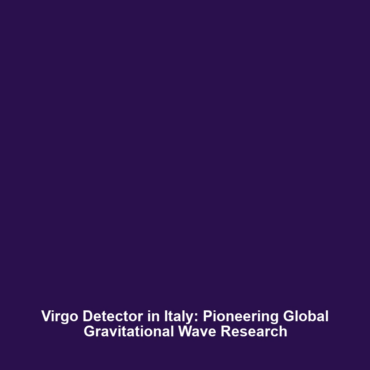The Virgo Detector in Italy and Its Role in International Collaboration
Introduction
The Virgo detector, located in Italy, plays a pivotal role in the groundbreaking field of gravitational waves. As a key player in the international effort to observe and analyze these ripples in spacetime, Virgo’s contributions are vital for understanding cosmic events. This article discusses how the Virgo detector facilitates international collaboration, enhancing our grasp of gravitational waves while showcasing its significance in astrophysics.
Key Concepts
Understanding Gravitational Waves
Gravitational waves are disturbances in spacetime caused by the acceleration of massive objects, predicted by Albert Einstein’s general theory of relativity. The Virgo detector is designed to measure these waves, providing scientists with data that furthers our understanding of the universe.
Virgo’s Design and Functionality
Established in 2003, the Virgo detector employs advanced laser interferometry technology, which measures changes in distance as gravitational waves pass through Earth. By collaborating with other detectors around the world, such as LIGO in the United States, Virgo enhances the data available for analyzing these cosmic phenomena.
Applications and Real-World Uses
The significance of the Virgo detector extends beyond theoretical physics. Notable applications include:
- Detecting Black Hole Mergers: Virgo has contributed to the identification of numerous black hole merger events, improving our understanding of black hole populations.
- Observing Neutron Star Collisions: The collaboration has allowed scientists to study the characteristics of neutron stars and the resulting electromagnetic signals.
- Enhancing Astrophysical Models: The data collected helps refine models of universe evolution and cosmic events, making Virgo indispensable in astrophysics.
Current Challenges
While the Virgo detector is a beacon of technological advancement, it faces several challenges, including:
- Technical Limitations: Sensitivity challenges hinder the detection of weaker gravitational waves.
- Environmental Interferences: Earthquakes, seismic noise, and other environmental factors can affect the accuracy of measurements.
- Data Overload: Managing the vast amounts of data produced poses logistical challenges in analysis and interpretation.
Future Research and Innovations
The future of gravitational wave detection is promising, with ongoing research focused on enhancing the Virgo detector’s capabilities:
- Advanced Techniques: The implementation of quantum sensing technologies may bolster sensitivity, allowing for the detection of fainter waves.
- Upgraded Interferometers: Future upgrades aim to improve the overall performance of Virgo and facilitate better international collaboration with LIGO.
- Increased Global Network: Collaborations among various detectors worldwide will enhance the ability to localize and characterize gravitational wave events.
Conclusion
In conclusion, the Virgo detector in Italy is an essential component of international collaboration in the detection and analysis of gravitational waves. As we look toward the future, innovations and enhanced cooperation among global research institutions promise to further unveil the mysteries of the cosmos. To learn more about the fascinating world of gravitational waves and further advancements in this field, visit our related articles page.
